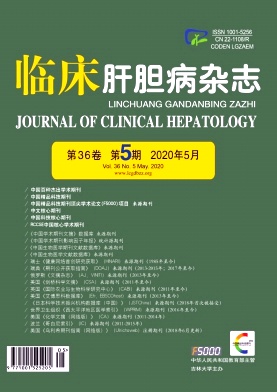Objective To investigate the changes in the diversity and structure of intestinal flora in patients with primary liver cancer after transcatheter arterial chemoembolization(TACE).Methods A total of 65 patients with primary liver cancer(among whom 20 received TACE) who were treated in The Affiliated Tumor Hospital of Guangxi Medical University from September 2018 to January 2019 were enrolled,and 27 individuals who underwent physical examination were enrolled as healthy group. High-throughput 16 S rDNA sequencing was used to analyze the structure of fecal bacterial communities, and Anosim, LEfSe software, and R language stats package were used to analyze the differences in the relative abundance, diversity, community, and evolutionary branching of intestinal flora between groups. Thet-test was used for comparison of normally distributed continuous data with homogeneity of variance between groups, and the Kruskal-WallisUtest was used for comparison of non-normally distributed continuous data between groups; the chi-square test was used for comparison of categorical data between groups. The Spearman rank correlation test was used for correlation analysis.Results At the phylum level, the dominant bacteria were Bacteroidetes and Firmicutes in each group, which accounted for > 90% in the healthy group and > 80% in the primaryliver cancer group and the TACE treatment group. Bacteroidetes accounted for 48. 44%, 44. 96%, and 48. 60%, respectively, in thehealthy group, the primary liver cancer group, and the TACE treatment group, and Firmicutes accounted for 47. 09%, 38. 15%, and33. 93%, respectively, in the three groups, suggesting that the primary liver cancer group had significantly lower relative abundance ofBacteroidetes and Firmicutes than the healthy group; in addition, the primary liver cancer group and the TACE treatment group had signifi-cantly higher relative abundance of Proteobacteria and Fusobacteria than the healthy group; although there were changes in the other phyla ofbacteria, these bacteria accounted for < 0. 5%. Compared with the primary liver cancer group, the healthy group had significantly higher a-bundance and ACE value of observed species(abundance: 264 ± 47 vs 230 ± 64,t =2.499,P= 0. 014; ACE value: 284. 11 ± 50. 82 vs252. 96 ± 67. 58,t =2.158,P= 0. 034). The rank between the primary liver cancer group and the healthy group was higher than that ineach of the two groups(R > 0), so the difference in the structure of intestinal flora between the two groups was significantly greater than thatwithin each of the two groups(P< 0. 05). The rank between the pre-TACE group and the post-TACE group was lower than that in thepre-TACE group(R < 0), so the difference in the structure of intestinal flora within the pre-TACE group and the post-TACE group wasgreater than that between the two groups(P> 0. 05). In the patients with primary liver cancer, intestinal opportunistic pathogens were cor-related with Child-Turcotte-Pugh(CTP) score, total bilirubin(TBil), alanine aminotransferase(ALT), and aspartate aminotransferase(AST)(r= 0. 245, 0. 421, 0. 327, and 0. 446,P =0. 049,P< 0. 001,P =0. 008, andP< 0. 001), and potential probiotics were corre-lated with CTP score, TBil, albumin, ALT, and AST(r=-0. 314,-0. 490, 0. 285,-0. 374, and-0. 528,P= 0. 011,P <0.001,P=0.022,P= 0. 002, andP< 0. 001). The abundance of the opportunistic pathogens among the differentially expressed bacteria increasedwith the increase in Child-Pugh class for liver function, and the patients with class C liver function had higher abundance than those withclass A or B liver function(Z =4. 301 and 4. 063,P =0. 038 and 0. 044). The relative abundance of potential probiotics tended to decreasewith the increase in Child-Pugh class for liver function, and the patients with class C liver function had lower abundance than those withclass A liver function(Z =3.882,P= 0. 049).Conclusion There are differences in the diversity and structure of intestinal flora betweenpatients with primary liver cancer and healthy individuals, and the patients with primary liver cancer have similar intestinal flora before andafter TACE, suggesting that TACE has little influence on intestinal flora. Intestinal dysbacteriosis is associated with the clinical classificationof primary liver cancer, and the degree of intestinal dysbacteriosis increases with the increase in Child-Pugh class for liver function, with areduction in potential probiotics and an increase in opportunistic pathogens.







 DownLoad:
DownLoad: